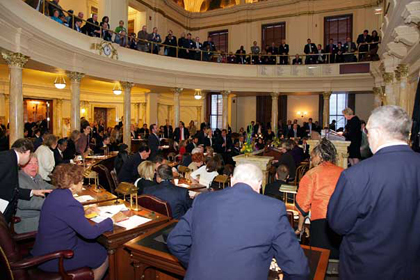
‘Adopt a Barnegat Bay Stormwater Management Basin Act’ Will Allow Businesses, Nonprofits to Clean Up Stormwater Basins, Reducing Pollution into the Bay
TRENTON – The Senate today unanimously approved legislation sponsored by Senators Paul A. Sarlo and Bob Smith that would allow for businesses and nonprofit organizations to adopt a piece of the Barnegat Bay and be responsible for clean-up and maintenance of stormwater basins in the Bay’s watershed.
“There are more than 2,000 storm water basins in the Barnegat Bay watershed that are failing and in desperate need of repair,” said Senator Sarlo (D-Bergen, Passaic). “These repairs are critically important to ensure improved water quality for New Jersey’s residents within the watershed. This legislation is a great way to create public-private partnerships with organizations and corporations throughout the state and to make it simple for them to contribute to repairs essential to the environmental health of their communities.”
“The ‘Adopt a Barnegat Bay Stormwater Basin Act’ is a great way for corporations, businesses and nonprofit organizations to give back to a community and the Bay that provides them with economic resources and a large consumer base with both the region’s year-round inhabitants as well as the millions of tourists who head to the shore each summer,” said Senator Smith, D-Middlesex, Chairman of the Senate Environment and Energy Committee. “This program is a win-win for participating organizations who will not only receive recognition for their efforts in reinvigorating Barnegat Bay, but also a tax credit for the amount they spend on maintenance, repairs and construction of rainwater basins.”
The bill, S-1084, would allow state or local municipalities to create adoption agreements with businesses or nonprofit organizations for maintenance, construction, improvement, operation or funding of stormwater management basins in the Barnegat Bay watershed. Stormwater basins are constructed to hold rainwater runoff and slowly release the water into a nearby waterway, mimicking the natural runoff that occurred prior to development. They help reduce the amount of pollutants from roadways, fertilizers and sediment that flow into the Barnegat Bay. Maintenance is imperative to these basins to avoid debris and sediment buildup and clogs in drainage, causing stagnant water, reduced capacity of runoff waters and mosquito infestations.
In return for their efforts to help clean up the Bay, participating businesses or nonprofits would receive a certificate of recognition and have the ability to erect a sign near their adopted basin. Additionally, they would receive a business tax credit equal to the amount of certified expenditures up to $1000 or 50 percent of the business’s total corporate tax liability, which ever is the lesser amount.
An amendment adopted in committee would expand this program to stormwater basins throughout the state, although the tax credits would be reserved for projects within the Barnegat Bay watershed.
“A clean and pollution-free Barnegat Bay is vital for the environmental and economic health of the shore region,” said Senator Sarlo. “Not only is the Bay one of the greatest natural and environmental resources we have, it is also an economic engine for New Jersey, bringing in more than $3.3 billion in revenue and supporting tens of thousands of jobs in its surrounding communities. Cleaning and maintaining these basins is an important step in ending the years of misuse of this ecological treasure and a significant step in reversing the destructive practices used in the overdevelopment of the region.”
“The Barnegat Bay watershed is considered the second most polluted watershed in the United States right after the Chesapeake Bay. Runoff from streets and roads has led to an increase in nitrogen in the Bay negatively affecting the areas water source and New Jersey’s fishing industry,” said Senator Smith. “This commonsense measure provides a plan to clean up, repair and maintain rainwater basins that are an important part of the Bay’s restoration with little cost to the taxpayers of New Jersey.”
The bill now heads to the Assembly for further consideration.

